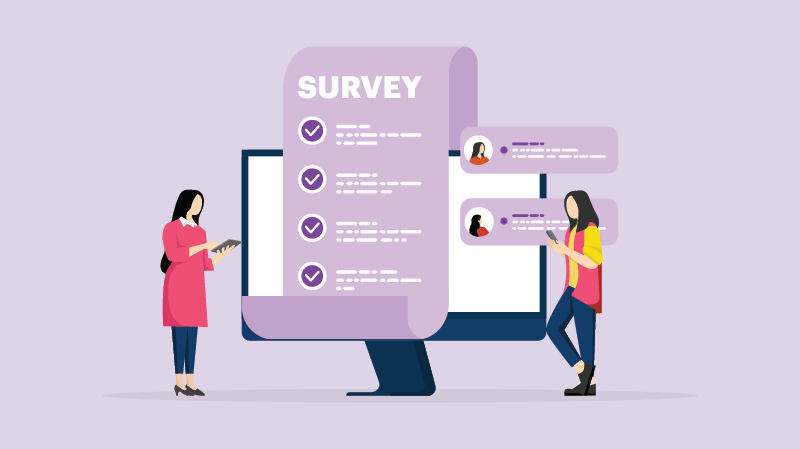Employee Engagement Survey: 35 Questions to Ask To Empower Employees
Employee engagement is critical for organizational success and it is not a check box item anymore. Employees who feel motivated, valued, and connected to their work are more productive. They provide better customer service, and are likelier to stay with the company.
But how can you focus on it without disrupting the workflow?
The answer to that is regular employee engagement surveys. It allows organizations to take the pulse of the workforce and identify areas working well. This creates opportunities for improvement within the organizational culture and enhance it.
In this post, we will provide 35 impactful employee engagement survey questions based on the key areas you must cover. Learning where your employees are satisfied or could use more support empowers leadership to maintain strengths and tackle challenges.
Let's delve in!
Key Takeaways
- A brief explanation of what employee engagement exactly is.
- The importance and best practices of employee engagement survey
- Types of questions to include in your survey
- Key areas to cover in a survey
- Avoiding common pitfalls in question design.
- Analyzing survey responses to improve engagement.
Understanding Employee Engagement
Employee engagement is the emotional connection an employee feels toward their workplace. The more driven they are, the higher the productivity. It is all about creating a work environment where employees go beyond their basic job requirements. This makes them committed to the organization and passionate about their jobs.
Read more: Employee Engagement: Creating An Engaging Work Culture
This is correlated with how employees behave and work within the organization. The significance of employee engagement is something that cannot be ignored. Some of its significance include:
-
Boost in creativity and innovation.
-
Enhanced team cohesion and collaboration.
-
Good customer service and experience.
-
Open to change and adaptive.
-
Better quality of work.
But to achieve that, you must understand how the employees think about the organization. And one good way is to conduct employee engagement surveys.
It will help you gather the necessary information that will boost your engagement efforts in the long run.
Importance of Employee Engagement Surveys
Understanding and improving employee engagement is vital for organizations seeking to motivate talent and drive performance. It also helps you in retaining your top performers.
The behaviors of highly engaged business units lead to a 23% difference in profitability. (Gallup)
One great thing about conducting employee engagement surveys is that they are easy to run. Moreover, they highlight the grey areas of the organization. But why these surveys?
In this section, we will explain 5 compelling reasons why organizations should implement engagement surveys:
1. Unearthing Hidden Insights:
Employee engagement surveys play an important role in identifying crucial insights. These surveys have the potential to reveal hidden issues that go unnoticed. The issues can include morale, productivity, and organizational culture.
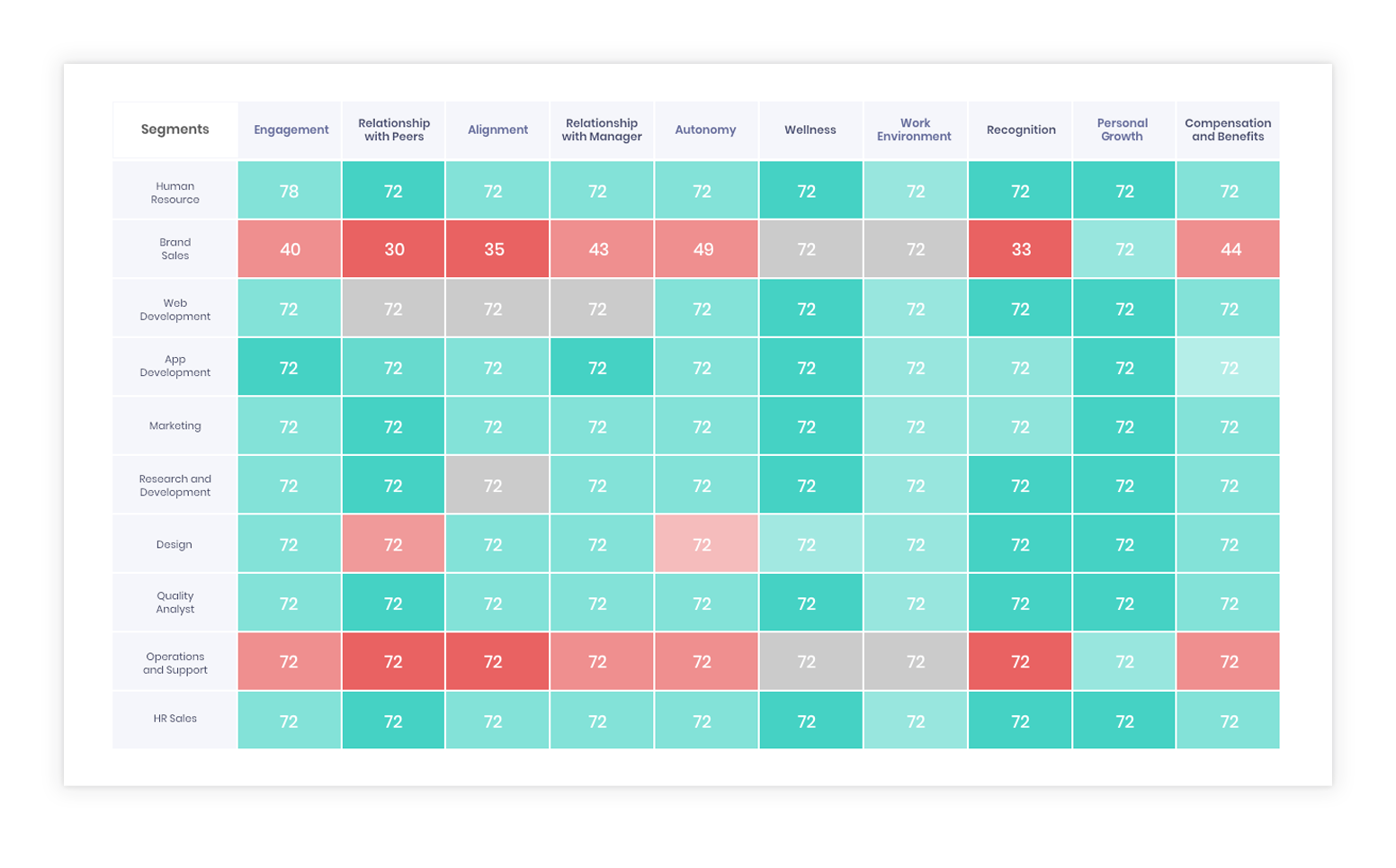
(Source: Vantage Pulse.)
The gathered input then helps in specifying the areas that require attention. Thus allowing organizations to focus on required adjustments and build an engaged workforce.
2. Empowering Employee Voice:
These surveys have the capability to provide the employees with a voice to raise their ideas and concerns. It also helps in demonstrating that an organization values its employees’ perspectives.
In return, it enhances morale and engagement of the employees within the organization. Furthermore, it also creates an environment that encourages diversity and inclusivity.
3. Measuring the Impact of Changes:
Organizational changes in the workplace can have a significant impact and consequences. But you can tackle them with the help of these surveys. It will help you determine the success of these initiatives.
Furthermore, organizations can also determine the impact of their decision and pivot strategies by measuring employee sentiment.
4. Enhancing Managerial Effectiveness:
The survey responses can give managers critical insights into their team dynamics and leadership effectiveness. It assists managers in identifying areas for improvement.
It includes communication, support, and leadership styles. Thus, resulting in more effective management and a more motivated workforce.
5. Predicting and Reducing Turnover:
Employee engagement surveys can serve as an early warning system for indicators of employee dissatisfaction, which may lead to attrition. Hence, it becomes essential for employers to figure out the problem beforehand.
Organizations can proactively resolve issues and reduce costly turnover by understanding what drives employee engagement and spotting red signals early.
Learn More: High Employee Turnover: 7 Major Reasons (+How To Solve Them)
Best Practices for Conducting Employee Engagement Surveys
Now that you have all the relevant information about the engagement surveys, what are the best practices to conduct them? Here are five ways that will ensure that you survey with the highest effectiveness.
1. Ensure Anonymity and Confidentiality:
Assure employees that their responses will be kept private and anonymous. When employees feel safe, they communicate their ideas without fear of consequences. This encourages honest and open feedback while conducting surveys.
2. Communicate the Purpose and Benefits:
Explain the goal of the survey and how the results will be utilized. This increases employee buy-in and provides a greater response rate because employees appreciate the importance of their participation.
3. Keep the Survey Concise and Relevant:
Create a concise survey on key issues. Survey weariness can result from lengthy or irrelevant surveys, lowering the quantity and quality of responses.
4. Regularly Conduct Surveys and Act on the Results:
Make employee engagement surveys a habit, and more importantly, act on the results. And to conduct them you can use pulse surveys which are virtual tools available in the market. These tools are easy to access and provides you the flexibility to conduct surveys as per you convenience. Some tools like Vantage Pulse also provides you pre-built templates of survey questions to ease you process.
And once you conduct the surveys, implement improvements based on feedback. Afterwards explain the actions to employees, demonstrating that their input results in actual changes in the organization.
5. Provide Feedback on Survey Results:
Share the survey's major findings and insights with employees. This will create a transparency between the management and the employees. It will also demonstrate that the organization respects their views which develops trust.
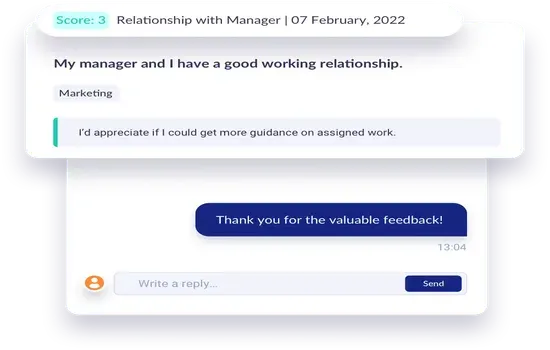
Moreover, you can also provide instant feedback if the tool allows you to. This will reduce the communication gap and keep feedback in real-time. In the long run this encourages participation in future surveys.
Examples of Effective Employee Engagement Questions
Before you start your engagement surveys, preparing a set of impactful questions is essential. However, you can randomly pick and include questions in the survey. You have to come up with the survey questions in certain ways. Below is a list of things that you need to consider.
Types of Questions to Include in Your Survey
1. Open-ended Questions:
These questions allow respondents to express themselves, resulting in rich, qualitative data freely. They are perfect for delving into difficult issues or getting specific feedback. On the other hand, analyzing open-ended comments can be time-consuming and may necessitate thematic analysis to discover common patterns or feelings.
Pros: Provides rich, detailed feedback; uncovers critical insights; allows for expression of nuanced thoughts.
Cons: Time-consuming to analyze due to its qualitative nature; responses may vary greatly in length and detail; potential for ambiguous or irrelevant answers.
2. Closed-ended Questions:
These are questions with preset responses, such as 'yes/no' or multiple-choice. They are simple to understand and useful for quantifying attitudes or behaviors. However, they limit the depth of reaction and may miss complex perspectives.
Pros: Easy to analyze and quantify; provides clear, concise data; ideal for statistical analysis and identifying trends.
Cons: Limits depth and nuance of responses; may not capture complex opinions or feelings; risk of oversimplifying complex issues.
3. Rating Scale Questions:
Respondents are asked to rate their level of agreement or satisfaction on a numerical or descriptive scale. They are effective for quantifying the intensity of feelings or ideas and allowing for easy comparison across groups or periods. However, the chosen scale can impact responses, and some responders may avoid extreme values.
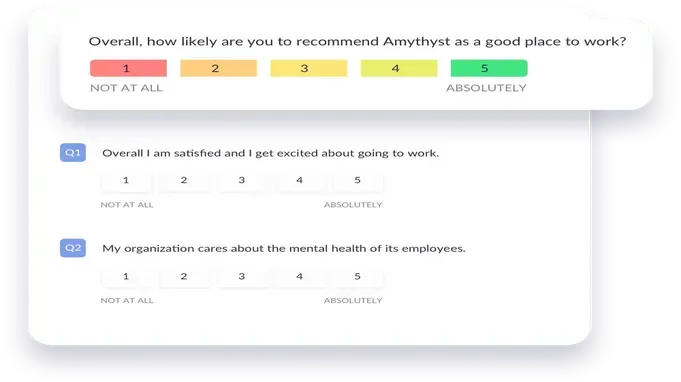
Pros: Allows for quantification of subjective data (like satisfaction levels); easy for respondents to complete; useful for benchmarking and comparisons.
Cons: Scale design may influence responses (like central tendency bias), may not capture the reasons behind a rating, and may be limited in exploring detailed explanations.
4. Ranking Questions:
Respondents are asked to prioritize or rank alternatives in order of preference or priority. They are useful for understanding preferences and weighing multiple possibilities. They can, however, be difficult for respondents if the list is too extensive or the possibilities are not immediately comparable.
Pros: Useful for understanding preferences and priorities; helps in comparing multiple items or aspects.
Cons: Can be difficult for respondents if there are too many items to rank; not suitable for measuring absolute values or opinions; there is potential for respondent fatigue if overused.
5. Demographic Questions:
Incorporating demographic questions (such as age, department, and tenure) might help contextualize other replies and detect trends or patterns across different groups. However, these should be used cautiously to avoid invading respondents' privacy or making them uncomfortable.
Pros: Provides valuable context for analyzing other responses; can reveal important trends and patterns across different groups.
Cons: Risk of privacy invasion if too personal; may cause discomfort or lead to biased responses; if not relevant to the survey's purpose, can reduce response rates.
Key Areas to Cover in Survey Questions
Now comes the part where you have to figure out the key areas you need to cover. So to help you with that, here are some of the things where you can kickstart your journey.
1. Job Satisfaction and Role Clarity
You need to determine how well employees understand their duties and responsibilities and their degree of job satisfaction. The questions can analyze alignment with personal goals, resource sufficiency, and job happiness. Hence, understanding this can help to identify areas for role enhancement and job enrichment in the long run.
2. Work Environment and Culture
As an employer, assess employees' perceptions of the workplace environment, including the physical surroundings and organizational culture. Some of the factors that you need to consider with the company's beliefs and ethics include-
-
Comfort
-
Safety
-
Inclusion, and
-
Consistency
These insights are critical for developing an effective workplace culture that will help you improve the bottomline.
3. Leadership and Management
Evaluate perceptions of leadership effectiveness in areas such as communication, decision-making, support, and vision. Understanding how leadership affects employee morale and productivity can help guide leadership development and management training activities. With enhanced leadership, employees will happily follow their leaders and give their best in the long run.
4. Personal Growth and Career Development
Analyze employees' perspectives on personal development and professional advancement chances within the organization. This includes access to training, feedback, and career advancement opportunities. Insights in this area can help guide employee development and retention tactics. In the long run, it will also help strengthen and strategize the right development plan for the employees.
Read more: 5 Reasons To Promote Employee Training And Development
5. Peer Relationships and Team Dynamics
Examine the quality of peer connections and team dynamics within the organization. Collaboration, communication, solving conflicts, and team cohesion are a few examples of it. A collaborative and supportive work environment requires strong peer relationships and good team dynamics. And you need to ensure that everything is in place for an effective workplace.
6. Recognition
Assess how the organization handles recognition and feedback. Questions should be asked to discover whether employees feel valued and recognized for their contributions. You need to figure out the grey areas and work on them. The bottom line is that recognition is critical for employees as it improves motivation and morale.
Learn More about recognition here and create a workplace that prioritizes it.
7. Benefits and Compensation
Inquire about employees' feelings about their pay and benefits. Questions about fairness, competitiveness, and how well benefits suit their requirements should be addressed. This is critical for employee retention while improving employer branding.
Sample Questions for Each Key Area
Here are at least 5 sample survey questions for each key area with appropriate response types:
1. Job Satisfaction and Role Clarity
-
"How well do you understand your job responsibilities?" (Rating Scale of 1-5, 5 being very well)
-
"Do you feel your work aligns with your personal goals?" (Yes/No with optional elaboration)
-
"How satisfied are you with your current role and duties?" (Rating Scale of 1-5, 5 being highly satisfied)
-
"Is there a clear path for career advancement in your role?" (Yes/No with optional elaboration)
-
"Do you receive regular feedback that helps you perform better?" (Frequency scale which includes: Always, Often, Sometimes, Rarely, Never)
2. Work Environment and Culture
-
"How would you rate the overall work environment at our company?" (Rating Scale of 1-5, 5 being very compatible)
-
"Does our workplace culture support work-life balance effectively?" (Yes/No with optional elaboration)
-
"How comfortable do you feel expressing your ideas and opinions?" (Rating Scale of 1-5, 5 being very comfortable)
-
"Do you believe the company's values align with your personal values?" (Yes/No with optional elaboration)
-
"How well does the company handle diversity and inclusion?" (Rating Scale of 1-5, 5 being very well)
3. Leadership and Management
-
"How effectively do your managers communicate expectations?" (Rating Scale of 1-5, 5 being highly effective)
-
"Do you feel that company leadership is transparent and honest?" (Yes/No with optional elaboration)
-
"How approachable are the leaders in our organization?" (Rating Scale of 1-5, 5 being very approachable)
-
"Do you believe leadership is committed to your professional growth?" (Yes/No with optional elaboration)
-
"How would you rate the support you receive from management?" (Rating Scale of 1-5, 5 being high level of support)
4. Personal Growth and Career Development
-
"Are you satisfied with the professional development opportunities available?" (Rating Scale 1-5, 5 being very satisfied)
-
"Do you have access to the resources needed for your career growth?" (Yes/No with optional elaboration)
-
"How often do you receive constructive feedback on your performance?" (Frequency scale which includes: Always, Often, Sometimes, Rarely, Never)
-
"Do you see a long-term career path for yourself in this organization?" (Yes/No with optional elaboration)
-
"Are mentorship or coaching opportunities available and accessible to you?" (Yes/No with optional elaboration)
5. Peer Relationships and Team Dynamics
-
"How would you rate the level of collaboration within your team?" (Rating Scale of 1-5, 5 being high level of collaboration)
-
"Do you feel your team effectively communicates and resolves conflicts?" (Yes/No with optional elaboration)
-
"How supportive are your colleagues in achieving shared goals?" (Rating Scale of 1-5, 5 being very supportive)
-
"Do you feel a sense of belonging in your work team?" (Yes/No with optional elaboration)
-
"Are team roles and responsibilities clearly defined and understood?" (Yes/No with optional elaboration)
6. Recognition
-
"Do you feel recognized and appreciated for your contributions?" (Yes/No with optional elaboration)
-
"How frequently do you receive recognition from your peers or managers?" (Frequency scale which includes: Always, Often, Sometimes, Rarely, Never)
-
"Does the company offer meaningful ways to recognize employee achievements?" (Rating Scale of 1-5, 5 being very meaningful)
-
"How would you improve the recognition system in our organization?" (Open-ended)
-
"Is the recognition you receive reflective of your actual performance?" (Yes/No with optional elaboration)
7. Benefits and Compensation
-
"Are you satisfied with your current compensation package?" (Rating Scale of 1-5, 5 being very satisfied)
-
"Do you believe your compensation is competitive with industry standards?" (Yes/No with optional elaboration)
-
"How well do the company's benefits meet your personal and family needs?" (Rating Scale of 1-5, 5 being it meets the need)
-
"Are the benefits and compensation structure clearly communicated and transparent?" (Yes/No with optional elaboration)
-
"Do you feel there are sufficient opportunities for financial growth in your role?" (Yes/No with optional elaboration)
Tips for Framing Questions to Elicit Honest Responses
Here are five unique and impactful tips for framing employee engagement survey questions to elicit honest responses:
1. Use Simple, Unambiguous Language: Create questions with basic wording and phrasing to avoid misinterpretation. Complex questions might frustrate the respondents.
2. Keep Questions Short: Long, dense questions might be confusing. When possible, keep questions to less than 20 words. Short, concise questions provide clarity.
3. Focus Questions on Specific Topic: Avoid broad questions involving multiple issues. Hyper-specific questions give clear issues for employees to react to.
4. Include Balanced Response Options: Provide scaled agree/disagree alternatives and neutral/moderate options to capture honest responses, even if it is not definitive.
5. Assure Anonymity: Employees should be assured that their responses will be anonymous. The lack of confidentiality discourages honesty. Analyze data solely in aggregate.
Avoiding Common Pitfalls in Question Design
It is quite easy to make mistakes while creating a survey. However, certain things can help you avoid pitfalls while designing a survey. Below is a list of things to refer to and lead a smooth engagement survey.
1. Avoid Leading Questions
It is critical to design impartial questions to avoid biasing respondents' responses. Leading questions imply a specific reaction, gently influencing the response. Instead, strive for impartiality in your phrasing to ensure the feedback is authentic and representative of your true feelings.
It is critical to analyze questions from the respondents' point of view, looking for any language that can subconsciously bias their answers.
2. Steer Clear of Double-Barreled Questions
Double-barreled questions, which address two concerns simultaneously, can perplex respondents and confuse the data obtained. It is critical to split such queries into discrete pieces for clarity and precision in feedback.
This method ensures that each inquiry is focused on a specific issue, resulting in more accurate and actionable findings.
3. Be Cautious with Open-Ended Questions
While open-ended inquiries may lead to detailed responses, their unstructured nature complicates analysis. It is critical to utilize them wisely and have a clear strategy for categorizing and evaluating the results.
These questions should be deliberately positioned to collect qualitative data that closed-ended questions may miss but not to overwhelm the analysis process.
4. Review All Survey Choices
The response alternatives supplied for each question should be carefully considered. They must be exhaustive and mutually exclusive, encompassing all feasible responses without overlap. This ensures that respondents can express their opinions accurately without being compelled to accept an option that does not accurately reflect their position.
To avoid skewing the findings, it's also vital to avoid designing options that are intrinsically more enticing or unpleasant.
5. Pilot Test the Survey
A pilot test with a small, diverse set of intended respondents is crucial for determining the effectiveness of the survey. This test can show flaws with question clarity, survey length, and overall flow that were previously undetected. This group's feedback can be essential in improving the survey to ensure it is well-understood, engaging, and capable of quickly capturing the necessary data.
Customizing Questions to Your Organization
To leverage engagement surveys, you must customize the questions based on the organizational needs. Effectively doing it will help you garner the response that will help you elevate your culture. Here are five things to consider when you customize your survey.
1. Reflect Company Values and Goals: Customize your questions to reflect your organization's basic values and goals. This ensures that the feedback you collect is relevant to your company's objective and vision.
2. Consider Industry-Specific Needs: Create questions specific to your industry's challenges and opportunities. A tech company, for example, may promote innovation and agility, whereas a healthcare provider may value patient care and staff well-being.
3. Incorporate Organizational Structure: Adapt the questions to suit your organization's structure. A flat organization, for example, may promote collaboration and peer input, whereas a hierarchical organization may emphasize leadership and management effectiveness.
4. Acknowledge Current Events or Changes: Include questions addressing whether your organization is undergoing significant changes or facing industry shifts. This can include questions about change management, remote working dynamics, or adapting to new technologies.
5. Use Employee Feedback for Customization: Employees should be included in the survey design process. Collecting preliminary feedback on what topics they find relevant or areas they believe might be improved will help make the survey customization more meaningful and engaging for your staff.
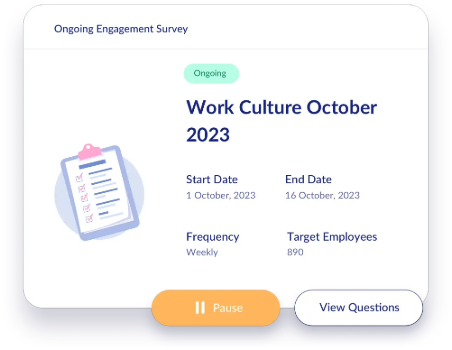
Analyzing Responses to Improve Engagement
Once you conclude the survey, what will be the next step forward? The focus will be on analyzing the responses and acting upon them. And to do that, here are five ways you can refer to.
1. Segment Data for Deeper Insights: Segment the survey results by demographics, departments, or tenure groups. This segmentation can reveal patterns and variances in organizational experiences, allowing for focused actions.
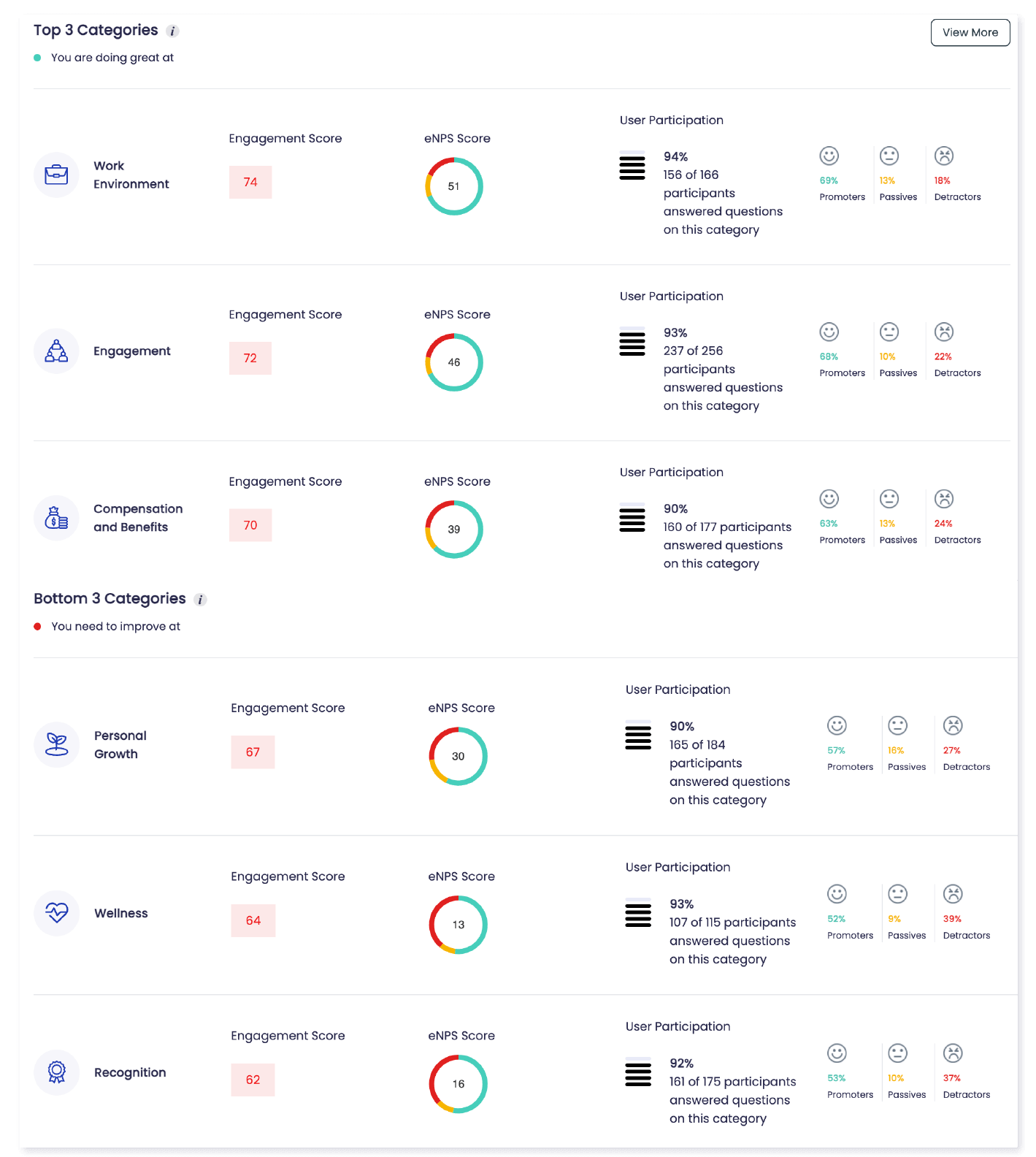
(Source: Vantage Pulse)
2. Identify Trends and Patterns: Examine the responses for common themes, patterns, and outliers. Recognizing recurring issues or general contentment in specific areas can assist in prioritizing activities and comprehending overall employee sentiment.
3. Correlate Data with Business Outcomes: Connect survey results to company KPIs like productivity, turnover, and customer happiness. This correlation contributes to a better understanding of how employee engagement affects organizational performance and can assist in influencing strategic decisions.
4. Act on Feedback with a Clear Plan: Create a detailed action plan based on the survey results. Address the major issues and capitalize on your strengths. Communicate this plan to employees to demonstrate that their input is valued and being acted upon.
5. Follow-Up for Continuous Improvement: Engagement surveys need not be done only once. Follow-up surveys or polls can be used to track the progress of initiatives and gauge employee sentiment. Continuous feedback loops help to keep strategies relevant and effective over time.
Conclusion
Now you have a fair idea of all the nuances surrounding employee engagement surveys. It is now upto you how you takeaway the best bits from this article and implement it. So, why wait? Delve in right away and create a work culture that everyone loves.














